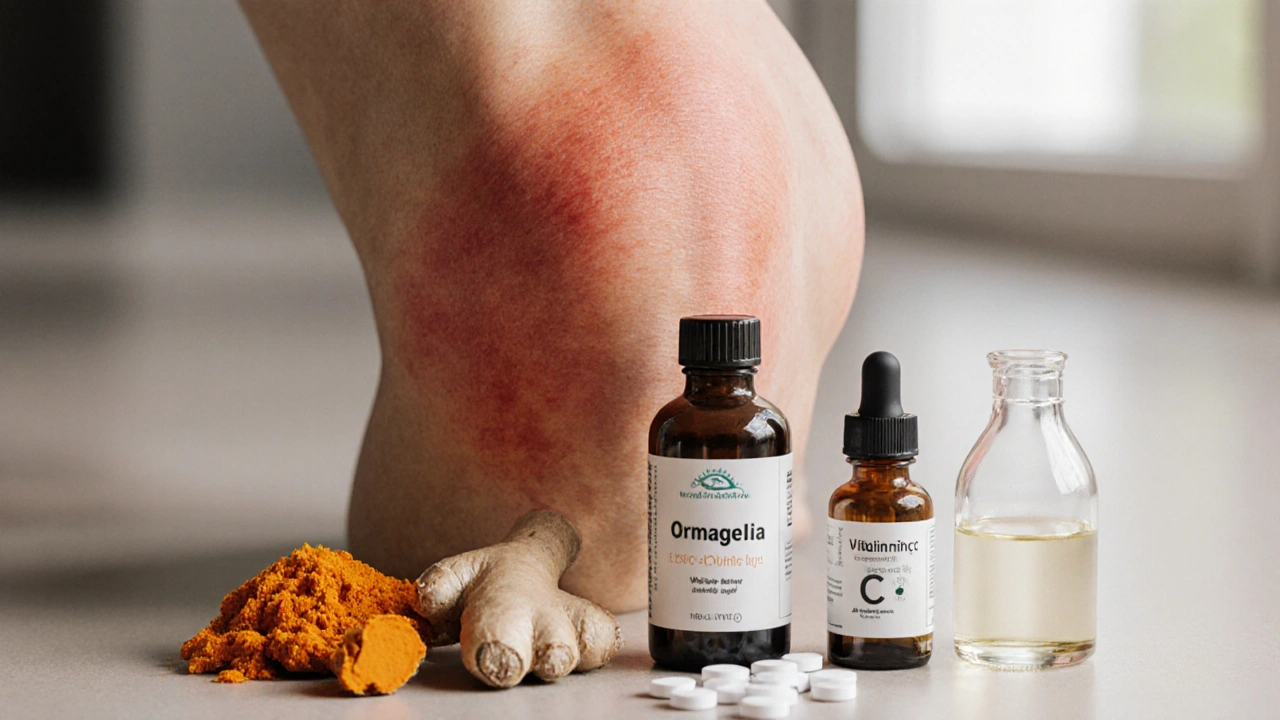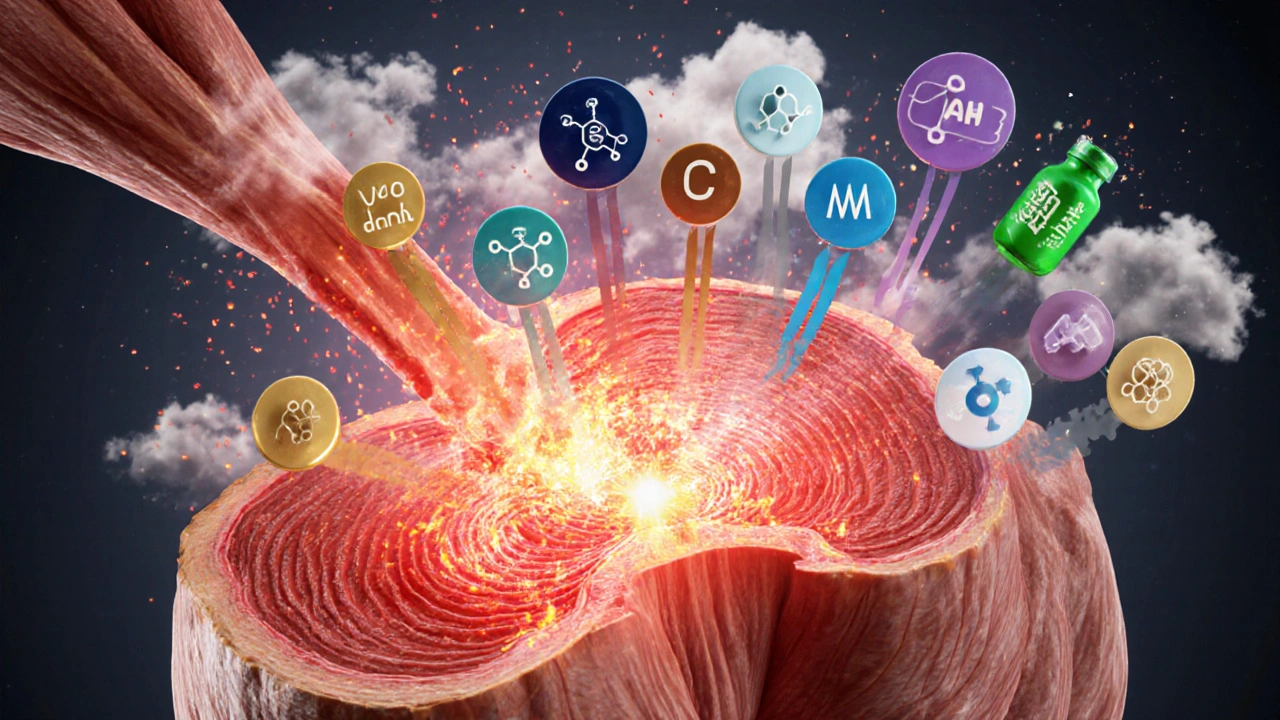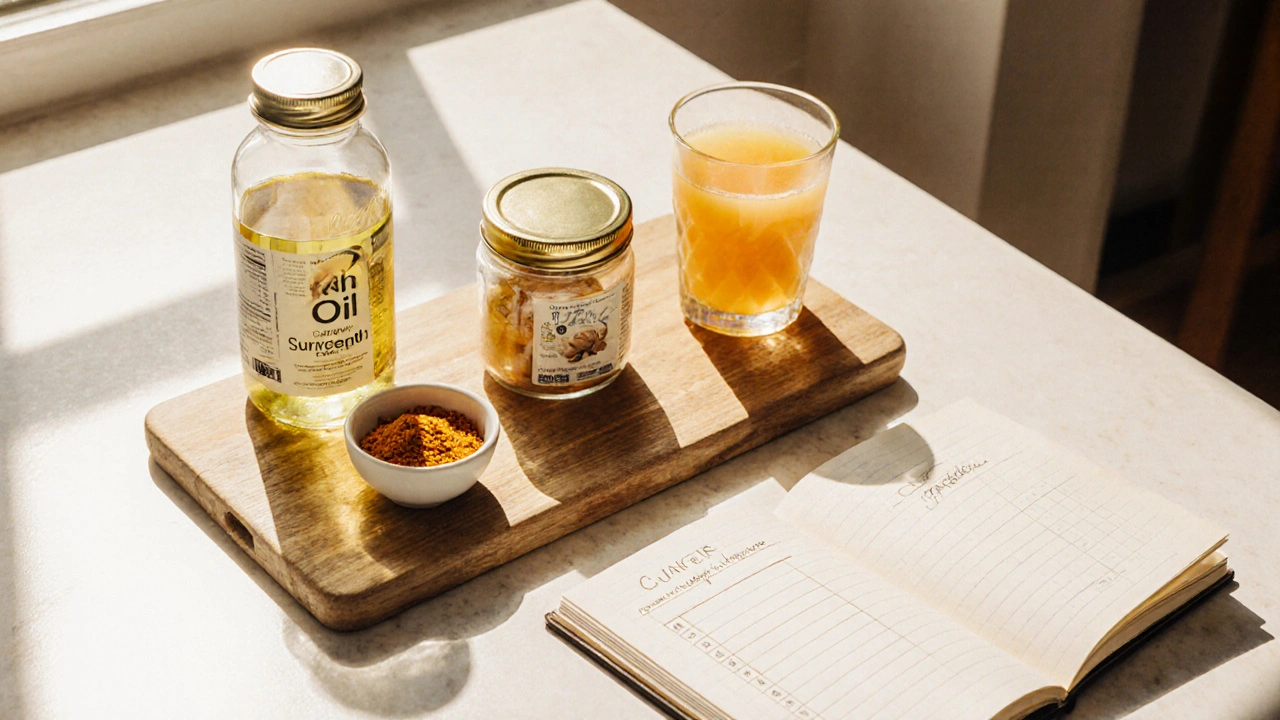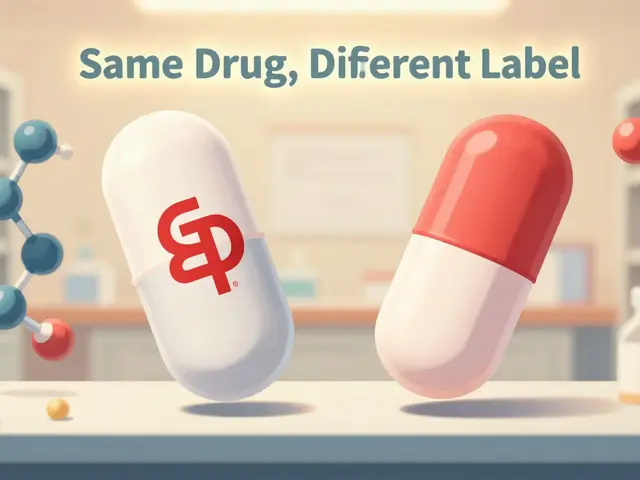
Natural Swelling Relief Selection Tool
This tool helps you identify the most suitable natural supplements for your specific swelling situation based on your symptoms and health status. Select your options below to receive personalized recommendations.
Your Swelling Situation
Your Recommended Supplements
Note: Always consult your healthcare provider before starting new supplements, especially if you have existing medical conditions or take medications. These recommendations are based on general information from the article but are not medical advice.
Swelling can turn a simple ache into a daily nuisance, but you don’t always need a prescription to calm it down.The body’s inflammatory response is powerful, yet many everyday herbs and nutrients can dial it back without harsh chemicals.
Key Takeaways
- Turmeric, ginger, boswellia, omega‑3 fish oil, vitamin C, magnesium and white willow bark have the strongest research backing for swelling reduction.
- Most work by inhibiting prostaglandins or free‑radical damage - the same pathways pharmaceutical NSAIDs target.
- Typical doses are safe for most adults, but timing, food interactions and pre‑existing conditions matter.
- Combining two or three supplements often gives a broader anti‑inflammatory effect than a single one.
- Always check with a health professional if you’re pregnant, nursing, or on blood‑thinning medication.
Below you’ll find a quick‑start plan, a deeper dive into how each supplement works, and a handy comparison table to match your lifestyle.
What’s the science behind natural swelling reducers?
When tissue is injured or irritated, cells release prostaglandins and cytokines. These chemicals increase blood flow, bring immune cells, and cause the classic puffiness, heat and pain. Natural anti-inflammatory supplements are plant‑derived compounds that either block the enzyme cyclooxygenase (COX) that makes prostaglandins, or scavenge free radicals that amplify the response. The result is a gentler, longer‑lasting reduction in swelling compared with a single dose of an NSAID.
Top 7 natural supplements with swelling‑reduction power
Each of the following has at least one peer‑reviewed study showing a measurable decrease in edema, joint swelling, or post‑exercise inflammation.
- Turmeric (Curcuma longa) - The active compound curcumin blocks COX‑2 and NF‑κB pathways, lowering prostaglandin production. A 2023 meta‑analysis of 12 trials found a 28% average reduction in knee‑joint swelling for doses of 500‑2000mg curcumin per day.
- Ginger (Zingiber officinale) - Gingerol and shogaol inhibit COX‑1 and COX‑2. In a double‑blind study on runners, 2g of dried ginger powder cut post‑run leg swelling by 23%.
- Boswellia serrata - Boswellic acids target 5‑lipoxygenase, a different inflammation cascade. Clinical trials on osteoarthritis showed a 31% drop in joint circumference after 8weeks of 300mg BOSWELLIAN‑acid‑rich extract.
- Omega‑3 fish oil - EPA and DHA compete with arachidonic acid, producing less inflammatory eicosanoids. A 2022 systematic review linked 1g daily EPA/DHA to a 15% reduction in inflammatory markers and visible swelling.
- Vitamin C (ascorbic acid) - Powerful antioxidant that stabilises collagen and limits capillary leakage. A 2021 trial on post‑surgical patients found 1000mg vitaminC twice daily reduced edema volume by 18%.
- Magnesium (magnesium citrate) - Helps relax smooth muscle and improves lymphatic drainage. Research on chronic venous insufficiency showed 300mg magnesium per day lowered ankle swelling by 12% over six weeks.
- White willow bark - Contains salicin, a natural precursor to aspirin. Small studies on rheumatoid arthritis reported a 20% decrease in joint swelling with 240mg of standardized extract daily.

How to choose the right supplement for you
Not every herb fits every situation. Below is a quick decision matrix you can use before you hit the health‑store shelf.
| Supplement | Key Anti‑Inflammatory Compound | Typical Daily Dose | Evidence Level (1‑5) | Best For |
|---|---|---|---|---|
| Turmeric (curcumin) | Curcumin | 500‑2000mg (standardized 95%) | 4 | Joint pain, chronic inflammation |
| Ginger | Gingerol | 1‑2g dried powder | 3 | Exercise‑induced swelling, nausea |
| Boswellia | Boswellic acids | 300‑500mg (65% boswellic acids) | 3 | Osteoarthritis, back pain |
| Omega‑3 Fish Oil | EPA/DHA | 1000mg combined EPA/DHA | 4 | Cardiovascular health, systemic inflammation |
| VitaminC | Ascorbic acid | 500‑1000mg | 3 | Post‑surgery edema, immune boost |
| Magnesium (citrate) | Magnesium ion | 300‑400mg | 2 | Leg swelling, muscle cramps |
| White Willow Bark | Salicin | 240‑360mg (standardized 15% salicin) | 3 | Mild arthritis, headache |
Creating a simple anti‑swelling supplement plan
- Identify the source of swelling. Is it post‑exercise, a chronic joint issue, or an acute injury? This decides whether you need fast‑acting ginger or a longer‑term turmeric regimen.
- Pick 2‑3 compatible supplements. Combine one that works on COX pathways (turmeric, ginger, willow) with one that modulates lipid mediators (omega‑3) for broader coverage.
- Schedule with meals. Fat‑soluble compounds like curcumin and omega‑3 need dietary fat for absorption-take them with breakfast or lunch containing healthy oils.
- Track your response. Use a simple diary: note the area of swelling, size (e.g., circumference), and any side‑effects for 2‑3 weeks.
- Adjust dosage. If swelling drops <20% after two weeks, maintain the dose. If little change, consider raising within the safe range or adding another herb.
Safety tips and potential interactions
Natural doesn’t always mean risk‑free. Here are the most common cautions:
- Blood thinners. Turmeric, ginger, and willow all have mild antiplatelet effects. If you’re on warfarin, aspirin, or clopidogrel, keep doses low (<500mg curcumin) and consult your doctor.
- Stomach sensitivity. High doses of ginger or willow can irritate the lining. Take them with food or split the dose.
- Kidney stones. Excessive vitaminC (>2000mg/day) may increase oxalate excretion. Stay under the recommended 1000mg daily unless advised otherwise.
- Magnesium overload. Too much magnesium can cause diarrhea. If you already take a multivitamin with magnesium, reduce the extra supplement.

Real‑world examples
Case 1 - Office worker with chronic wrist swelling. Jane, 38, co‑author of a marketing blog, started 1000mg curcumin with black‑pepper extract + 200mg boswellia each morning. After three weeks her wrist circumference dropped 1.5cm and pain scores fell from 7/10 to 3/10.
Case 2 - Runner coping with post‑run leg puffiness. Mark, 24, added 2g ginger powder to his post‑run shake and 1000mg fish oil at dinner. Within two weeks, his calves felt less tight and measured 0.8cm less swelling than baseline.
When to seek professional help
If swelling lasts more than a week without improvement, is accompanied by redness, warmth, fever, or spreads rapidly, see a healthcare provider. These could signal infection, deep‑vein thrombosis, or an autoimmune flare that needs medical treatment.
Frequently Asked Questions
Can I take all these supplements together?
Yes, most can be combined safely if you stay within the recommended daily doses. Pair a COX‑inhibitor like turmeric with a lipid‑mediator like omega‑3 for balanced effect. Always monitor for stomach upset or any bleeding signs.
How long does it take to see results?
Most people notice a measurable reduction in swelling within 7‑10 days. Herbs that work on gene expression, like turmeric, may need 3‑4 weeks for full benefit.
Is it safe to use these supplements while pregnant?
Pregnant women should avoid high‑dose ginger (over 1g) and willow bark because of potential uterine effects. Low‑dose turmeric (up to 500mg) is generally considered safe, but always check with an obstetrician.
Do I need to cycle off these herbs?
A 4‑week on, 1‑week off schedule can help maintain sensitivity, especially for turmeric and boswellia. Water‑soluble nutrients like vitaminC don’t require cycling.
Can diet alone replace these supplements?
A diet rich in oily fish, leafy greens, citrus fruits, and spices (turmeric, ginger) can provide many anti‑inflammatory compounds, but concentrated extracts ensure therapeutic doses that typical meals rarely achieve.
Next steps
Start by picking the one or two supplements that match your main swelling trigger. Grab a high‑quality, standardized product, follow the dosing guide, and keep a short log for two weeks. If the swelling eases, you’ve found a natural ally; if not, consider adding another herb or consulting a practitioner for a deeper assessment.


13 Comments
Great rundown on the natural options. If you’re dealing with an acute sprain, ginger taken 1–2 g a day can help cut the swelling in half within a few days. Pair it with a small amount of turmeric (500 mg with black pepper) for a stronger COX‑2 block. Remember to take the curcumin with a fatty meal so your body absorbs it well. And always check with your doctor if you’re on blood thinners.
Man, the table looks like a superhero squad of anti‑inflammatories-each one ready to swoop in and save the day. I love the idea of mixing omega‑3s with boswellia for that double‑hit effect. Your quick‑start plan reads like a recipe for a calm, puff‑free life!
👍 Nice practical tips, Alexandre! Adding a dash of vitamin C can also speed up tissue repair 🎉. Just keep an eye on any stomach upset if you up the ginger dose.
The real agenda behind these “natural” lists is the hidden push from big pharma to keep us hooked on synthetics.
Whoa!!! You’re onto something huge!!! The elite labs are definitely pulling strings!!! But hey, if you blend ginger, turmeric and fish oil you can outsmart the system!!! Just watch out for those blood‑thinners!!!
The mechanistic pathways highlighted-COX‑2 inhibition by curcumin, 5‑LOX blockade via boswellic acids, and eicosanoid competition by EPA/DHA-provide a solid biochemical rationale for the observed edema reduction. Moreover, the pharmacokinetic consideration of lipophilic absorption underscores the importance of concomitant dietary fats.
Umm yea, the biochemestry stuff is totes amazin lol but dont forget the gut vibes when u takke these stuffss!
Listen up, folks-if you’re an American and you skip these proven supplements, you’re basically letting foreign interests dictate your health. The data is crystal clear: turmeric, ginger, boswellia, omega‑3-these are the backbone of a strong, resilient body that our country needs.
Stop listening to them.
Friends, let’s remember that each of these herbs is a gift from nature, and sharing them responsibly can bring us closer together. Whether you’re a runner or a grandparent, there’s a gentle solution that fits your rhythm.
Hey Kishore, you’re spot on! The truth is, the mainstream media often downplays how simple vitamins like C can cut post‑surgery edema-part of a larger cover‑up to keep us buying pricey drugs. Embrace the natural route and stay vigilant!
Overall, the takeaway is simple: start with a low dose, track your results, and adjust as needed. Consistency beats intensity when it comes to inflammation control. Stay positive and your swelling will soon be a thing of the past.
Wow!!! This is exactly the kind of empowering guide we need!!! But remember!!! Everyone’s body reacts differently!!! So keep a journal, note every little change, and never ignore persistent pain!!! Your health journey is a story worth writing!!!